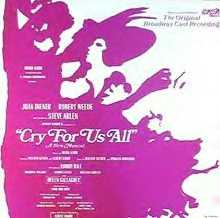Production
The musical had pre-Broadway tryouts in New Haven and Boston at the Colonial Theatre (in February 1970). During the New Haven run the title was changed to Who to Love. There were many rewrites during this time; Mitch Leigh, referring to the Boston run, said: "In New Haven, we were in good shape...Everything that could have happened, happened here." [1]
Also during tryouts, the character of Josephine Finn was removed and the actress who played the role, Margot Moser, left. Diener's role was made bigger. The musical initially had two acts but was presented in one act by the Broadway opening. Eight songs were cut during tryouts and previews. [2]
The musical premiered on Broadway on April 8, 1970 at the Broadhurst Theatre, where it ran for only nine performances and eighteen previews. Directed by Marre, conductor Herbert Grossman served as music director. The cast included Joan Diener as Kathleen Stanton, Helen Gallagher as Bessie, Tommy Rall as Boyle, Steve Arlen as Matt Stanton, Dolores Wilson as Maria Haggerty, Paul Ukena as John Haggerty, and Robert Weede as Mayor Quinn. [3] [4] In his review for Women's Wear Daily, Martin Gottfried wrote that the score was not "reflective of its time and place" but that Leigh's music was "inventive, rhythmically interesting and very singable." [2]
Weede received a 1970 Tony Award nomination for Best Actor in a Musical, and Howard Bay was nominated for the Tony Award for Scenic Design. [4]
An original cast recording was released on the TS1000 label. A CD was released by Kritzerland.
This page is based on this
Wikipedia article Text is available under the
CC BY-SA 4.0 license; additional terms may apply.
Images, videos and audio are available under their respective licenses.
